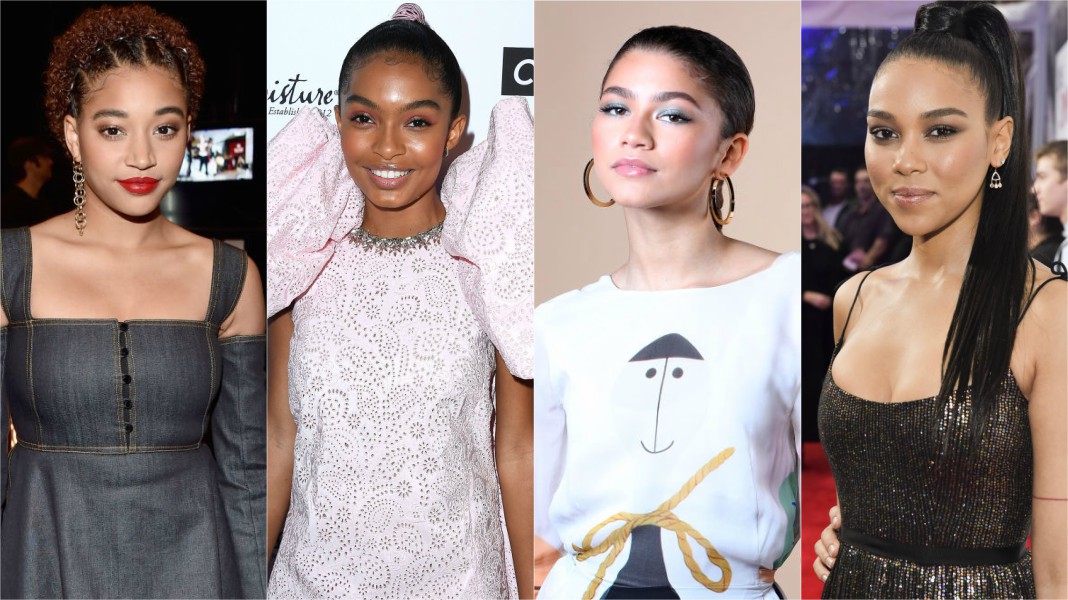
Getty
While checking out the Instagram page of fashion site FashionBombDaily this past weekend, I came across a photo of Yara Shahidi, bedecked in a poofy pink gown at the Marie Claire “Fresh Faces” party on Friday. When I went to see what people thought of the look, I was surprised to see the tone of things took a negative turn. A simple question as to why pro-Black celebrities like Shahidi only seemed to wear pieces from white designers on the red carpet turned, for one individual, into an opportunity to accuse the Blackish and Grownish star of keeping actresses of a darker complexion from obtaining roles. This individual was actually referring to Amandla Stenberg and the controversy over her role as Starr in the upcoming The Hate U Give adaptation, but incorrectly identified Shahidi as the offender. When I politely tried to correct them, instead of acknowledging the error, the person said, “Yara, Amandla and Alex Shipp are all guilty of this.” To which I replied, in my head, “Really?”
I’m well aware that colorism is still a very big issue in Hollywood, and in life, as are actresses like Shahidi, Stenberg, Shipp, Zendaya Coleman and Amanda Seales. They’ve all given beloved and panned viewpoints on the topic when confronted with it. Stenberg even backed out of auditioning for Black Panther because of it. But I’m not going to lie. The conversations we have about this issue are trite. The same questions are asked, and in incredibly presumptuous, hurtful ways.
In every chat, an entertainer of a lighter complexion is asked how they have personally benefited from being light, because it’s assumed that they’ve lived a life of more privilege. An entertainer of a darker complexion is asked how they’ve been stifled in a sense because of their look, because it’s assumed that they’ve always been passed over in casting calls.
And in between, there are those situations where those who do share their experiences with colorism on their own are heard, but not truly listened to (think Amara La Negra on The Breakfast Club for example). Their situations are instead seen as an excuse and replacement for the hard work and hustle that it’s perceived others are putting in as they climb up the Hollywood ladder of success.
Honestly, it’s become the Oppression Olympics. We open our ears for people we deem have had it worse, all while assuming everyone else’s lives and experiences have been a walk in the park. If not that, then we don’t open our ears, but instead, tell people they have “issues” they need to work through because they happen to still be scarred from their youth. If not that, then we get upset when those we somehow expect to single-handedly change representation in Hollywood by handing over their jobs, come off defensive. We do all of these things without evaluating the fact that each person has dealt with their own struggle, which for them, was very real and traumatic.
All of this has made the colorism conversation, which we claim we need to have, nonconstructive and divisive. In fact, it almost feels as though it’s creating an environment where we see certain Black women as problematic. If they’re not doing or saying what we feel they should to change representation for everyone, they’re not for us a whole, but only looking out for themselves.
Can we please start over?
If we are to truly be able to come to an understanding and hopefully have an impact when it comes to changing things, instead of trying to constantly call out who has privilege and who doesn’t, we need to do more listening than talking. Yes, your experiences are valid. The pain you’ve suffered is real. But you aren’t the only one. Every Black person endures a form of struggle at some point in life. Being darker or lighter doesn’t make you the only person to be accosted by police officers. It doesn’t mean you are the only person followed through a store or called ugly or teased about the way you look or the way your hair curls in school. We’ve all dealt with hurt, which is probably what makes those constantly questioned about how they’ve benefited and haven’t so upset. And don’t even get me started on those in the middle (“brown” people I guess) who are constantly cast aside in these conversations.
Instead of bringing us together, it just feels, constantly, like the way we go about talking about colorism continues to drive us further apart in understanding. You can’t have an impact, if first and foremost, you don’t know how to talk to people about it. And you can’t go far, if secondly, you only hear yourself.
Those who believe colorism is an old-school issue, that by ignoring it and not making an effort, when they can, to push for opportunities for people of all shades and backgrounds of our own, are a problem. But if you ask me, so are the people who only see their pain, only hear their stories, and instead of trying to have mature conversation, would prefer to simply call out and cancel.









